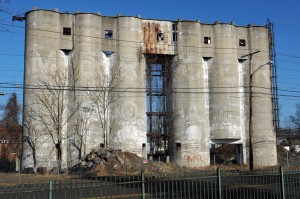Not yet 3 years old, the Stratford Redevelopment Agency represents the town”™s foreclosure-backed plan to remediate brownfields and get them back on the tax rolls. In so doing, Stratford assumes what town officials acknowledged recently were “the headaches and expenses” of testing and remediation at the likes of former gas stations and manufacturing sites.
The upside is developer interest where previously there was none.
“Since we”™ve been pretty lucky as far as remediation with our grant work, we”™ve received a lot of calls from potential developers,” said Karen Kaiser, the town”™s director of economic development. Prior to town involvement, she said developers feared “the shadows and ghosts” such sites can present.
The RDA”™s mission is to “devise and implement a diverse plan to promote industrial, economic and commercial development.” Its successes to date have begun with foreclosures of tax-delinquent sites that bear the additional burden of contamination. Site testing and remediation are funded by state and federal grants.
To date, the agency has secured eight grants totaling $5,659,000. The biggest grant ”” $2.85 million from the state Department of Economic and Community Development”™s brownfield redevelopment program ”” is set to remake a Longbrook Avenue industrial site beginning this month.
Four foreclosed properties ”” including the 540 Longbrook Ave. former Contract Plating site ”” are now owned by Stratford through the RDA, started by Mayor John Harkins and piloted by a trio of Stratford municipal workers: Kaiser, Town Attorney Tim Bishop and Brian Carey, the town”™s conservation administrator.
Bishop said the foreclosure process offers the town time and protection. “We don”™t have liability for the property and it gives us time to put together funds and a good plan,” he said. “Because we used foreclosure we have some breathing room. If we had bought the properties, remediation would have had to happen up front. By taking them in foreclosure, we can hold them and assess all their issues.”
The threat of foreclosure has had the additional benefit of producing $350,000 in delinquent tax payments last year. In a typical pre-RDA year, that figure was $50,000, the officials said. “We”™re working aggressively to bring those properties more than 10 years behind in taxes to foreclosure or get them to pay,” Kaiser said.
Each brownfield by the nature of its history is unique. The manufacture of Corsair airplanes and “Huey” helicopter engines left their marks on the Stratford waterfront at the Stratford Army Engine Plant, while carbon residues are the problem at a 1-acre site on Stratford Avenue, the Mercer coal towers. Those differences and others, according to the town officials, make brownfield parcels antagonistic to boilerplate solutions.
The ready-for-remake Contract Plating site will host Harkins to kickoff the cleanup effort there Feb. 11, 11 a.m. It and the Mercer coal towers ”” a former fuel and bulk coal storage facility that received a $200,000 federal Environmental Protection Agency cleanup grant ”” have a pair of similar, town-owned parcels directly behind them in the cleanup queue.
Through the same foreclosure process that gained control of the sites on Longbrook and Stratford avenues, the town has gained title to 993 Honeyspot Road, the former Peasely Products manufacturing site, and an EPA Superfund site at 576/600 E. Broadway in Stratford.
Carey said developers shy away from problems like PCBs (a thick lubricant) and asbestos; many brownfields are contaminated with fuels. “Without government funding, these projects would not go forward,” Carey said.
Bishop said that “after 10 years, in some cases 15 years” without paying taxes, “These properties were never going to come back on the tax rolls.”
The RDA has five, mayor-appointed members: Randy Vidal, partner with Westport-based commercial real estate services firm Vidal/Wettenstein; Tony Nizzardo, partner with Stratford-based N&S Electric Inc.; Tom Malloy, president/CEO, Wilton-based Altus; George Perham, vice president, Bridgeport-based architecture and design firm Antinozzi Associates; and Rich Whalen, retired executive, Fairfield-based Bigelow Tea.
Their work is building. “To date the town has taken title to four blighted properties and is in the process of foreclosing on many more,” the agency said in a statement. “This agency is assigned with the task of getting these properties cleaned up, redeveloped and back on the town”™s tax rolls, growing the grand tax list.”


















